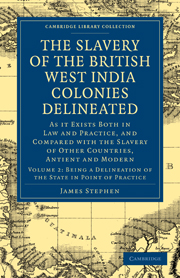 The Slavery of the British West India Colonies Delineated
The Slavery of the British West India Colonies Delineated Book contents
- Frontmatter
- PREFACE
- Contents
- BOOK II DELINEATION OF THE STATE OF SLAVERY IN OUR COLONIES, IN ITS ORDINARY PRACTICAL NATURE AND EFFECTS
- CHAPTER I REASONS FOR RESUMING THIS WORK; DEFENCE OF THE FIRST, AND PLAN OF THE SECOND VOLUME
- CHAPTER II OF AGRICULTURAL LABOUR IN THE TORRID ZONE, AND THE PERNICIOUS EFFECTS OF ITS EXCESS WHEN FORCIBLY EXACTED
- CHAPTER III THE HIGH PROBABILITY THAT THE AMOUNT OF FORCED LABOUR ON SUGAR PLANTATIONS IS OPPRESSIVELY AND DESTRUCTIVELY EXCESSIVE, DEDUCED FROM THE NATURAL TENDENCY OF THE SYSTEM; AND CONFIRMED BY THE DECLINE OF POPULATION AMONG THE PREDIAL SLAVES
- CHAPTER IV THE ACTUAL ORDINARY DETAILS AND GENERAL AMOUNT, IN POINT OF TIME, OF FORCED LABOUR ON SUGAR PLANTATIONS PARTICULARLY STATED AND PROVED; AND THE CRUEL EXCESS DEMONSTRATED
- CHAPTER V THE LABOUR SHEWN TO BE EXCESSIVE ALSO, FOR THE MOST PART, IN POINT OF INTENSITY, OR THE DEGREE OF ACTUAL EXERTION
- CHAPTER VI COMPARISON OF THE AMOUNT OF SLAVE LABOUR ON SUGAR PLANTATIONS WITH THAT OF AGRICULTURAL LABOURERS IN ENGLAND
- CHAPTER VII THE MEANS BY WHICH LABOUR IS ENFORCED ON SUGAR PLANTATIONS GREATLY AGGRAVATES ITS SEVERITY, AND ARE IN THEIR NATURE AND EFFECTS EXTREMELY CRUEL AND PERNICIOUS
- CHAPTER VIII THE MAINTENANCE OF THE PLANTATION SLAVES IS IN A VERY OPPRESSIVE AND CRUEL DEGREE PARSIMONIOUS AND INSUFFICIENT
- CHAPTER IX THE ALLOWANCES OF CLOTHING TO THE FIELD NEGROES BY THEIR OWNERS IS ALSO IN A SHAMEFUL DEGREE PENURIOUS AND INSUFFICIENT
- CHAPTER X THE SLAVES ARE VERY BADLY LODGED
- CHAPTER XI THE SLAVES ARE ALSO TREATED WITH GREAT HARSHNESS, NEGLECT, AND INHUMANITY WHEN SICK
- CHAPTER XII THE WHOLE EXPENSE OF THE MAINTENANCE OF PLANTATION SLAVES ESTIMATED AND COMPARED WITH THE COST OF FREE LABOUR
- CHAPTER XIII CONCLUDING AND PRACTICAL REFLECTIONS
- APPENDIX: CASES OF CRUELTY, INDICATING THE GENERAL PREVALENCE, IN THE SUGAR COLONIES, OF INSENSIBILITY TO THE SUFFERINGS OF SLAVES, AND AN INDISPOSITION TO RESTRAIN OR PUNISH THE AUTHORS OF SUCH OFFENCES
CHAPTER VIII - THE MAINTENANCE OF THE PLANTATION SLAVES IS IN A VERY OPPRESSIVE AND CRUEL DEGREE PARSIMONIOUS AND INSUFFICIENT
Published online by Cambridge University Press: 07 October 2011
- Frontmatter
- PREFACE
- Contents
- BOOK II DELINEATION OF THE STATE OF SLAVERY IN OUR COLONIES, IN ITS ORDINARY PRACTICAL NATURE AND EFFECTS
- CHAPTER I REASONS FOR RESUMING THIS WORK; DEFENCE OF THE FIRST, AND PLAN OF THE SECOND VOLUME
- CHAPTER II OF AGRICULTURAL LABOUR IN THE TORRID ZONE, AND THE PERNICIOUS EFFECTS OF ITS EXCESS WHEN FORCIBLY EXACTED
- CHAPTER III THE HIGH PROBABILITY THAT THE AMOUNT OF FORCED LABOUR ON SUGAR PLANTATIONS IS OPPRESSIVELY AND DESTRUCTIVELY EXCESSIVE, DEDUCED FROM THE NATURAL TENDENCY OF THE SYSTEM; AND CONFIRMED BY THE DECLINE OF POPULATION AMONG THE PREDIAL SLAVES
- CHAPTER IV THE ACTUAL ORDINARY DETAILS AND GENERAL AMOUNT, IN POINT OF TIME, OF FORCED LABOUR ON SUGAR PLANTATIONS PARTICULARLY STATED AND PROVED; AND THE CRUEL EXCESS DEMONSTRATED
- CHAPTER V THE LABOUR SHEWN TO BE EXCESSIVE ALSO, FOR THE MOST PART, IN POINT OF INTENSITY, OR THE DEGREE OF ACTUAL EXERTION
- CHAPTER VI COMPARISON OF THE AMOUNT OF SLAVE LABOUR ON SUGAR PLANTATIONS WITH THAT OF AGRICULTURAL LABOURERS IN ENGLAND
- CHAPTER VII THE MEANS BY WHICH LABOUR IS ENFORCED ON SUGAR PLANTATIONS GREATLY AGGRAVATES ITS SEVERITY, AND ARE IN THEIR NATURE AND EFFECTS EXTREMELY CRUEL AND PERNICIOUS
- CHAPTER VIII THE MAINTENANCE OF THE PLANTATION SLAVES IS IN A VERY OPPRESSIVE AND CRUEL DEGREE PARSIMONIOUS AND INSUFFICIENT
- CHAPTER IX THE ALLOWANCES OF CLOTHING TO THE FIELD NEGROES BY THEIR OWNERS IS ALSO IN A SHAMEFUL DEGREE PENURIOUS AND INSUFFICIENT
- CHAPTER X THE SLAVES ARE VERY BADLY LODGED
- CHAPTER XI THE SLAVES ARE ALSO TREATED WITH GREAT HARSHNESS, NEGLECT, AND INHUMANITY WHEN SICK
- CHAPTER XII THE WHOLE EXPENSE OF THE MAINTENANCE OF PLANTATION SLAVES ESTIMATED AND COMPARED WITH THE COST OF FREE LABOUR
- CHAPTER XIII CONCLUDING AND PRACTICAL REFLECTIONS
- APPENDIX: CASES OF CRUELTY, INDICATING THE GENERAL PREVALENCE, IN THE SUGAR COLONIES, OF INSENSIBILITY TO THE SUFFERINGS OF SLAVES, AND AN INDISPOSITION TO RESTRAIN OR PUNISH THE AUTHORS OF SUCH OFFENCES
Summary
Section I. — This Proposition shewn to be highly probable from the Native of the Case
Having demonstrated that the forced labour on sugar estates is oppressively severe, in all the various views I have taken of it, in its duration, its intensity, and the means of its exaction, and that the consequences are highly cruel and pernicious; I have next, in pursuance of the plan proposed, to state “the ordinary treatment of the slaves in respect of “food, clothing, and other necessaries, under the general head “of maintenance:” and first, as to the most important article, food.
But here, as in the preceding branches of my subject, I have prepossessions to encounter, as well as bold and artful and assiduous misrepresentations of the actual practice, to refute; I will, therefore, again request my readers to reflect on the inherent probabilities of the case, before I state the facts to them, and adduce the evidence.
It was shewn that the natural and inevitable tendency of the master's avarice or selfishness, armed with irresistible power, and even of his necessities, consequent on the eager competition that has long prevailed between planters, both British and foreign, in the supply of the European markets with sugar, must be to cheapen the forced labour employed in its production, to a degree highly oppressive upon the helpless enslaved workmen by whom the commodity is raised.
- Type
- Chapter
- Information
- The Slavery of the British West India Colonies DelineatedAs it Exists Both in Law and Practice, and Compared with the Slavery of Other Countries, Antient and Modern, pp. 243 - 341Publisher: Cambridge University PressPrint publication year: 2010First published in: 1830


